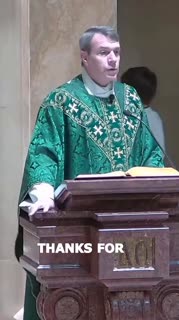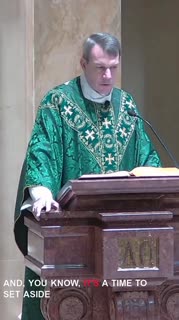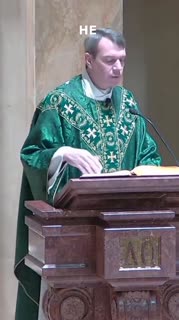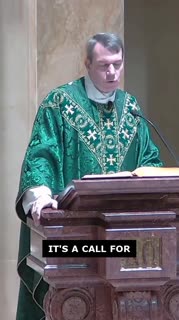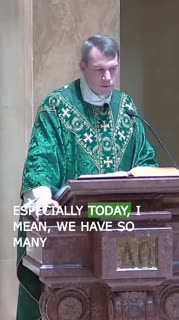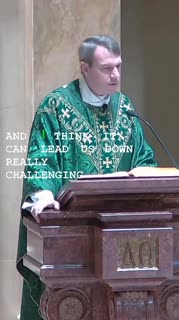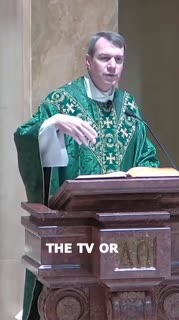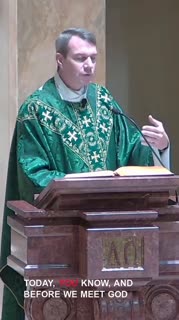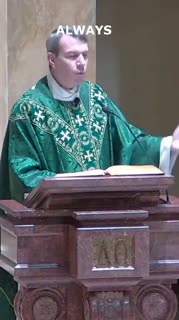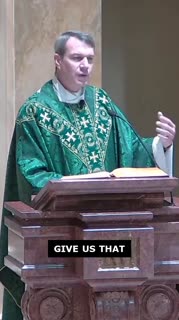Living Love: Preparing for Judgment and Communion
Devotional
Sermon Summary
Bible Study Guide
Sermon Clips
1. "Thanks for coming to pray this morning as we celebrate this 31st Sunday in ordinary time. Again, we're getting to the end of the liturgical year for us. Again, New Year starts with Advent as we get to the end of November and beginning of December. And we always have at this time of the year reflections on kind of end time things, end of life things, judgment things. We're going to have these themes throughout November. And of course, the month started November 1st, the feast, the solemnity of all saints. And so we set aside time to celebrate all of the saints in the history of the world. So it's really everybody in heaven. You know, we consider everyone in heaven to be a saint. One is in perfect union with God, in God's house, in God's kingdom." ([00:00:21] (45 seconds)
)
2. "And, you know, it's a time to set aside to reflect on all of our loved ones who have passed before us and entrusting them to God's merciful love, to his forgiveness, to God's grace, and asking that we have a role within it. And it begs us to kind of really pause and reflect a little bit on, you know, judgment and standing before the Son of Man, as the Scripture says we will all do at the end of our lives. And, you know, one of the great gifts that, you know, we have in our createdness as human beings is that we have the gift of free will. We're all free. And we're free to choose to be here, choose not to be here. We're free to choose what we do with our day. We have freedom. And before the Lord, you know, there's that freedom." ([00:01:16] (44 seconds)
)
3. "And he quotes to him, you know, you shall love the Lord your God with all your heart, with all your strength, with all your soul. And Jesus adds, and love your neighbor as yourself. And this man, you know, and when he responds to this scribe who's quoting Moses, quoting Deuteronomy. And even today, it's such an important passage of scripture for the Jewish people that, you know, you'll see some of the Orthodox Jews, if you ever see them praying, the ones that have the long hair, they'll put this words in a little box and tie it to their forehead or tie it to their wrist or tie it to their heart so that these words of scriptures are bound to them. They can keep them close to them." ([00:03:58] (36 seconds)
)
4. "It's a call for all of us to really sift through how are we putting God first, and what does it really mean to love, to love God as we're called to. And I think in the month of November, what we can go through and really process through is a real examination. You know, obviously every time I go to confession, you know, we do an examination of conscience. Where am I at? What am I saying? What am I doing? What's driving me? And is it what God wants for me? Was it loving and good to the world around me? We do examination to kind of sift through, you know, what we've been, what we're doing, what we're thinking." ([00:04:34] (35 seconds)
)
5. "Especially today, I mean, we have so many blessings in our own particular day when we live. There's so many things that are accessible to us, so much knowledge that is accessible to us. The use of technology is phenomenal. What our medicine can do in this country, I mean, it's such a great gift. Whether us personally or we know people have been so benefited from, you know, the medical field in our own time, it's come from a development of knowledge and there's so many things we know. On the flip side of that, the negative side about that. You know, I think we live in a day and age when things are presented in front of us that, you know, people before us didn't have to deal with." ([00:05:59] (39 seconds)
)
6. "And I think it can lead us down really challenging paths, I think, when we think through daily life and we think through what's God asking of me today and what I'm called to be today. And we put too much in front of us, and we take on things that are not our own. You know, it can really distract us from paying attention to what God really wants us to pay attention to and spousal relationships, the household, the things and the people that we engage in. are involved in on a daily basis and you know certainly this particular time political season election coming up on on tuesday obviously and there's so many themes and so many things being discussed and so many things you know going on there to reflect on and think of that are beyond sometimes our individual vote." ([00:07:21] (45 seconds)
)
7. "just turning on the TV or looking at different things in society, there's so many things that are pushed in front of us that can take us away from being grounded in the here and the now, in this particular moment, which is, in a sense, we have to do that in order to prepare for the here and now of the judgment when we'll get there, to be ready for, yes, I was paying attention to what was in front of me, who was in front of me. I was making decisions based on what information I had, what I was able to affect. My yes and my no mattered for the world in which I was particularly engaged and not about things that were beyond me." ([00:08:27] (37 seconds)
)
8. "today, you know, and before we meet God face to face when free will ends, you know, we have the ability right now to give our time, our energy to our loved ones who have passed on, to pray for them, to ask for God's healing and strength, to ask to be admitted into the kingdom, to offer sacrifices of fasting, of time, of prayer for our loved ones. We have the ability to sit here this day and make the decision on how I'm going to live this day, how I'm going to function this day, what I'm going to do with my time and my energy, and is it really loving in order towards the good that leads to a successful judgment, that the conversation with Jesus goes well, you know, something that we want and are proud to communicate to him." ([00:10:26] (38 seconds)
)
9. "I think always to get there and to look, you know, what is it the Lord asking of me? Sometimes we've got to shut out the things that are beyond us and that are things that we cannot affect, that is not our particular voice or our particular vote or our particular yes or our particular ability, you know, to engage and refocus on. What is it? What are you asking of me, Lord? Who can I affect this day? What are you asking of me to give of the best of myself, that I'm loving the Lord with all my heart, my strength, my soul, and I'm loving my neighbor as best I can, and I'm giving I can, what I can, to who I can, right in front of me this particular day." ([00:11:44] (36 seconds)
)
10. "You know, always kind of give us that guidance to see what it is that he's inviting us to pay attention to, who it is that he's inviting us to pay attention to, and maybe the things that are a little beyond our control that might cause anger or jealousy or shame or whatever it might be that we can get caught up in when things we can't really affect and frustration and all those kinds of things that, you know, we can take a little bit of time to let them be distanced from us and really focus on who he wants us to love this day, who he wants us to engage this day, and by doing that, building up the kingdom of God, building up the body of Christ, caring for those in our midst, and allowing the Eucharist to truly have an effect on our daily life." ([00:12:44] (40 seconds)
)
Ask a question about this sermon
)
2. "And, you know, it's a time to set aside to reflect on all of our loved ones who have passed before us and entrusting them to God's merciful love, to his forgiveness, to God's grace, and asking that we have a role within it. And it begs us to kind of really pause and reflect a little bit on, you know, judgment and standing before the Son of Man, as the Scripture says we will all do at the end of our lives. And, you know, one of the great gifts that, you know, we have in our createdness as human beings is that we have the gift of free will. We're all free. And we're free to choose to be here, choose not to be here. We're free to choose what we do with our day. We have freedom. And before the Lord, you know, there's that freedom." ([00:01:16] (44 seconds)
)
3. "And he quotes to him, you know, you shall love the Lord your God with all your heart, with all your strength, with all your soul. And Jesus adds, and love your neighbor as yourself. And this man, you know, and when he responds to this scribe who's quoting Moses, quoting Deuteronomy. And even today, it's such an important passage of scripture for the Jewish people that, you know, you'll see some of the Orthodox Jews, if you ever see them praying, the ones that have the long hair, they'll put this words in a little box and tie it to their forehead or tie it to their wrist or tie it to their heart so that these words of scriptures are bound to them. They can keep them close to them." ([00:03:58] (36 seconds)
)
4. "It's a call for all of us to really sift through how are we putting God first, and what does it really mean to love, to love God as we're called to. And I think in the month of November, what we can go through and really process through is a real examination. You know, obviously every time I go to confession, you know, we do an examination of conscience. Where am I at? What am I saying? What am I doing? What's driving me? And is it what God wants for me? Was it loving and good to the world around me? We do examination to kind of sift through, you know, what we've been, what we're doing, what we're thinking." ([00:04:34] (35 seconds)
)
5. "Especially today, I mean, we have so many blessings in our own particular day when we live. There's so many things that are accessible to us, so much knowledge that is accessible to us. The use of technology is phenomenal. What our medicine can do in this country, I mean, it's such a great gift. Whether us personally or we know people have been so benefited from, you know, the medical field in our own time, it's come from a development of knowledge and there's so many things we know. On the flip side of that, the negative side about that. You know, I think we live in a day and age when things are presented in front of us that, you know, people before us didn't have to deal with." ([00:05:59] (39 seconds)
)
6. "And I think it can lead us down really challenging paths, I think, when we think through daily life and we think through what's God asking of me today and what I'm called to be today. And we put too much in front of us, and we take on things that are not our own. You know, it can really distract us from paying attention to what God really wants us to pay attention to and spousal relationships, the household, the things and the people that we engage in. are involved in on a daily basis and you know certainly this particular time political season election coming up on on tuesday obviously and there's so many themes and so many things being discussed and so many things you know going on there to reflect on and think of that are beyond sometimes our individual vote." ([00:07:21] (45 seconds)
)
7. "just turning on the TV or looking at different things in society, there's so many things that are pushed in front of us that can take us away from being grounded in the here and the now, in this particular moment, which is, in a sense, we have to do that in order to prepare for the here and now of the judgment when we'll get there, to be ready for, yes, I was paying attention to what was in front of me, who was in front of me. I was making decisions based on what information I had, what I was able to affect. My yes and my no mattered for the world in which I was particularly engaged and not about things that were beyond me." ([00:08:27] (37 seconds)
)
8. "today, you know, and before we meet God face to face when free will ends, you know, we have the ability right now to give our time, our energy to our loved ones who have passed on, to pray for them, to ask for God's healing and strength, to ask to be admitted into the kingdom, to offer sacrifices of fasting, of time, of prayer for our loved ones. We have the ability to sit here this day and make the decision on how I'm going to live this day, how I'm going to function this day, what I'm going to do with my time and my energy, and is it really loving in order towards the good that leads to a successful judgment, that the conversation with Jesus goes well, you know, something that we want and are proud to communicate to him." ([00:10:26] (38 seconds)
)
9. "I think always to get there and to look, you know, what is it the Lord asking of me? Sometimes we've got to shut out the things that are beyond us and that are things that we cannot affect, that is not our particular voice or our particular vote or our particular yes or our particular ability, you know, to engage and refocus on. What is it? What are you asking of me, Lord? Who can I affect this day? What are you asking of me to give of the best of myself, that I'm loving the Lord with all my heart, my strength, my soul, and I'm loving my neighbor as best I can, and I'm giving I can, what I can, to who I can, right in front of me this particular day." ([00:11:44] (36 seconds)
)
10. "You know, always kind of give us that guidance to see what it is that he's inviting us to pay attention to, who it is that he's inviting us to pay attention to, and maybe the things that are a little beyond our control that might cause anger or jealousy or shame or whatever it might be that we can get caught up in when things we can't really affect and frustration and all those kinds of things that, you know, we can take a little bit of time to let them be distanced from us and really focus on who he wants us to love this day, who he wants us to engage this day, and by doing that, building up the kingdom of God, building up the body of Christ, caring for those in our midst, and allowing the Eucharist to truly have an effect on our daily life." ([00:12:44] (40 seconds)
)
